#young adult librarians
Text
I’m at my local library today to do some school stuff and a new display caught my eye that I thought I’d share. It’s geared toward young adults and encourages them to write in the books!
Seems like maybe these copies were going to be taken out of circulation, but instead they thought it would be fun to let the kids doodle in the margins, highlight bits they like, and otherwise share their thoughts in the pages so the next reader can see them. Very cool, would love to see other libraries try this out.
2 notes
·
View notes
Text
So you're an adult who wants to start reading for fun, but you don't know where to start
I'm a librarian, and I hear at least once a week from people who sheepishly tell me that they'd love to start reading for fun (for the first time or after a long break). Here's my best advice broken down into bullet points, but start here: there is no shame in being a beginner.
-Think about what you do enjoy and start from there. So you're not a book person. Do you like movies? Television? Podcasts? Music? Tabletop games? Video games? What other media do you like and what does it have in common? Make a little list and Venn diagram that shit.
Maybe you're into stories about fucked-up families (Sharp Objects, Succession) or found families (lots of realplay TTRPG podcasts, Leverage, Avatar: The Last Airbender) or fucked-up found families (various Batman media, Steven Universe, The Good Place). Maybe you mainly watch or listen to stuff for the romance (Taylor Swift music, The Best Man, Heartstopper) or the sci-fi horror (The Magnus Archives, M3gan, Nope) or the romantic sci-fi horror (Welcome to Night Vale).
And hey, maybe you're not a fictional media person at all. What do you like? What do you want to know about? World history? True crime? Home improvement? Birdwatching? Gardening? Various animals and their behavior? Human psychology? Cooking? If it's a thing, there are books about it. Start there.
Think about why you started to dislike reading. Did an adult snatch a book you thought looked cool out of your hands and say "Don't read that, it's below your reading level/above your reading level/a comic, not a real book"?
Did school give you an endless parade of miserable, bleak books and tell you they were universal stories about the human condition? Or did it maybe only give you stories with saccharine, unearned happy endings, or only show you stories about straight cis wealthy abled white kids, or keep you from reading entire books at all in favor of endlessly dissecting tiny passages out of context? (For some vindication, check out "How Teachers Make Children Hate Reading" by John Holt.)
Did you have an older sibling or a friend who was better at reading? Did adults put you in competition with that other kid and make you feel like shit about it?
Were you in a situation where you were good at reading in one language, or even more than one, but required to read in another that you were still learning? Did this make you feel like you were "behind schedule" or like you shouldn't read at all?
Or was reading just harder for you than it seemed for other people? Did reading give you headaches? Did the letters or numbers seem to float around on the page? Was it hard for you to focus for long enough to get through a whole book? Did you need to learn to read differently than the kids around you could? Did adults punish you for this instead of helping you? (Look, I'm not a doctor, but if any of these apply to you, consider going to an optometrist, a psychologist, and/or a psychiatrist to talk about these things if they're persistent and interfere with your life.)
Or maybe you're burned out on reading. Maybe you did an advanced degree in literature or writing or history or some other reading-heavy discipline and you're just tired. Maybe your professors or classmates got snobby about what constituted "literary" works and their good opinion didn't line up with what you actually enjoy.
You get to be sad and angry about these things, if they happened to you. They're also clues to how to move forward if you'd like to read more, or enjoy reading more.
Give yourself permission to read whatever you want, in whatever way you want. Wanna start with young adult books? Middle grade books? Awesome. Many of them have stories that are sophisticated and complex. Starting with re-reading the first books you enjoyed reading could help jog your memory about why you initially found it fun. Hell, even picture books are a good start. Have you read a picture book lately? Those things are getting cooler every day.
Comics and graphic novels? Those count as reading. Many of them are published for adults, though again, the ones published for a middle-grade or young adult audience are often complex and moving. If you're an anime fan, give manga a shot. The source material for many anime go deeper into the characters and stories, especially now that anime seasons are often truncated to 12 episodes for entire series. (The right-to-left thing is easier to get used to than you think, too.)
Romance novels and mystery thrillers and science fiction and fantasy? Those count as reading. Many of the things you might have liked about the books you read as a child or a teenager are present in adult "genre" fiction, and many of the things you might despise about adult "literary" fiction (god, I hate that word, but that's another post) may be absent from those titles.
E-books and audiobooks definitely count as reading, and they're often more accessible than paper books for some people. Anybody who tries to genre- or format-shame you is a dick and not worth talking to.
Go to your local library. All right, shameless self-promotion here, I'll admit it. But I promise you, if you walk into a library and say "I'm an adult, I stopped reading a while ago, and I'd like to start back up again but I need suggestions," you will make someone's day.
I get asked for my opinion about books approximately once a month. I get asked how to use the printer approximately eighty-five times a day. I love helping with the printer and I'm saying that unironically, but my colleagues and I absolutely adore "readers' advisory" questions. If you come with the answers to the above questions about your preferred genres, formats, and reasons you'd like to read, it'll help the process, but most of us are trained to ask follow-up questions to get you the best possible book match.
Do not apologize. You are not bothering us. It is literally part of our job. We want people to know that reading is fun, and you are a people.
#librarians and booksellers: i would love it if you added more tips to this#librarians#booklr#books and reading#reading#literacy#media#young adult#book recommendations#public libraries#books & libraries#booksellers#books#comic books#adult literacy#media literacy#child literacy
362 notes
·
View notes
Text
"...if a kid can’t afford to buy the book, go to the library and get it. Libraries are amazing! They offer these things to people in their community.
"Y’all: LIBRARIES ARE UNDER ATTACK BY GROUPS TRYING TO ENSURE THESE BOOKS DO NOT GET INTO THE HANDS OF READERS. This is not only school libraries. It is not only public libraries. There are states literally working to outlaw entire categories of books from reaching the teens for whom they are already financially inaccessible.
"Not only that, but librarians and educators are being put under the threat of losing their jobs, their livelihoods, their health insurance, and their actual lives by legislators across the country who are eager to criminalize them for having 'inappropriate' books in their collections. These legislators are listening to right-wing Christian nationalists calling certified educators and librarians groomers for simply having the books that reflect their communities in the collection."
#censorship#banned books#YA literature#young adult literature#libraries#librarians#tumblarians#library workers#groomer discourse#also known as#fascism#yes this is fascism this is what fascism does sounds and acts like#yeah i'm tired of those tags too tough shit
356 notes
·
View notes
Text
As a kid’s bookseller, with a major chain, I find today’s news piece in The Bookseller reporting on "a notable shift towards shorter children’s books" incredibly resonant. Because publishers are not “judging children’s reading standards realistically. Nor are the people in the higher echelons of bookselling. I think both have “been guilty of favouring the books we as already bookish adults enjoy reading, losing sight of the actual child the books are intended for”.
What’s more, I would say the resulting “pedestal” treatment of overly long, overly complex, very often fantasy or borderline fantasy books is driving young readers away. Presented with 300 pages of world building, the majority of the children I meet, will baulk. The fence is too big, too early. I don’t blame them. I can’t read these massively complex books. I have a number of books (and I don’t want to name them) that have been lauded but which I haven’t bothered to finish reading because they’re too much like hard work, and the storytelling is not strong enough to compensate. And I have read Ulysses.
Recently, and I quote, a bookseller who has worked in bookselling for over 25 years called a children’s book that has won prizes in US and UK: “Wonderful, loved every minute of it, possibly the best book I’ve read all year – but it ain’t for kids.” These books are marketed at kids, but really, they’re for adults.
READ MORE
9 notes
·
View notes
Text
brb gonna get my library to acquire the entire lockwood & co series because apparently we don’t have any of the books????? more proof of how our YA section has been lacking (which i’m currently trying to fix)
#lockwood and co#lockwood & co#l&co#l&co netflix#anthony lockwood#lucy carlyle#the screaming staircase#jonathan stroud#libraryblr#libraries#ya books#young adult#young adult books#support libraries#librarian
29 notes
·
View notes
Text
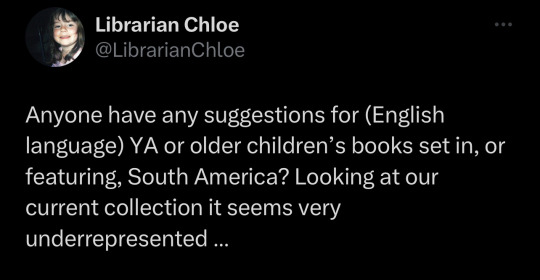
I know I used to have some mutuals / followers on here that had a better grasp of South American literature - if anyone can throw me a handful of suggestions that would be a massive help!!
#literature#ya#young adult#ya lit#ya fiction#(for clarification I’m a school librarian lol)#(for extra clarification that’s my professional account. my actual personal Twitter is not librarianchloe lmao)
6 notes
·
View notes
Note
in what country is young adult fiction geared at 12-18 year olds? like 18 I understand but 12 to 17 year old aren't adults..?
my understanding based on working in schools/with school librarians in the united states is that young adult fiction is geared toward middle/high school-aged kids (so around 12-18) to help bridge the gap between children's books and adult lit. series like percy jackson & the olympians, the hunger games, the inheritance cycle, artemis fowl, the mortal instruments, etc all fall under the ya genre. current trends in ya lit are honestly pushing the genre up age-wise, imo.
#i've heard a lot of librarians refer to ya as 'teen lit' idk. i'm not that pedantic about the genre i just have certain feelings about--#-- things/spaces for young people being slowly turned into things/spaces for adults to consume#this all started over me saying that ya lit should be accessible and affordable for actual youth btw#asks#books
2 notes
·
View notes
Text
Help! Looking for a book title.
It’s a children’s/young adult book I came across in the late 80s/early 90s. IIRC, it was about a pair of sisters—can’t remember if they were Japanese American or Chinese American.
What I recall the most is that some girls stole the older sister’s white thread so that she had to sew her white garments with colored thread—but she was such a good seamstress that the colored thread didn’t show.
Ring any bells? Thanks in advance!
15 notes
·
View notes
Text
i am thinking Very Hard ab the way that i think if tate were to show someone he recently met photos of him as a teenager (there arent many) they would struggle to really see it as the same guy or at the very least have that kind of. Moment of thought before the oh wow you look different
#like beyond the very obvious teenage dirtbag vs mid 30s cat lover librarian lookin ass man#but even just like. as a teen his teeth are so bad vs as an adult having full dentures (this is a self insert trait)#and the way as a kid hes always kinda greasy and dirty and his clothes are kinda worn down and ripped and shit#and how thin and clearly a bit malnourished he was#but also the. he always looked kinda angry when he was young and he was kinda feral and intense w his anger#and its not until hes had that time w benji that he lets himself be happy and SHOW that hes happy#just the. god getting into a relationship w benji just so drastically shifted the entire trajectory of his life#and if he hadn't gotten w benji (or [insert ur muse here]) he never would've gotten the chance to thrive and grow#and he most likely never would've lived past 20#and i just. i am squeezing tate in my hands like a stress ball
2 notes
·
View notes
Text
Crave by Tracy Wolff
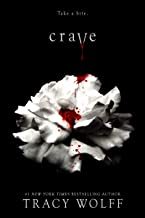
Category - Young Adult Fantasy
Author: Tracy Wolff
Publisher: Entangled Teen
“There’s not much to be afraid of when you’ve already lost everything that matters.”
― Tracy Wolff, Crave
Crave by Tracy Wolff is a Young Adult novel following Grace in her senior year at Katmere Academy. Arriving in the middle of Alaska for school after her parents died, Grace discovers that her new school is nothing like what she expected. Grace's Uncle Finn is the headmaster, and her cousin Macy is a student but both are reluctant to reveal much about the school promising to help her settle in despite the unusual stares and behavior of the students from the moment she arrives. The school feels older than anything in Alaska should be and the students seem different from other teenagers she has met. When the handsome Jaxon Vega cryptically warns her to stay far away from Katmere Academy Grace finds herself more intrigued by what the school has to offer and finds herself in a world she never knew existed.
If you've heard about this book, you've probably been on tiktok within the last few years. When I was going through the books I wanted to read for my class I knew I wanted to pick a book that has gone viral on booktok due to the fact that tiktok is so accessible to so many students in high schools now. As a librarian, it's essential to know what books are trending, and what is becoming popular on social media. Hence, you have those books available within the library for students to read. Not everything trending on tiktok is appropriate for teenagers and it's important as a librarian to go through and make assessments individually based on your community and experience but the Crave series is a YA series which makes it a great pick for a high school library and one of the reasons I thought it would be a good review pick.
Crave is a book I didn't expect to love when I picked it up. I grew up amidst the rise of the Twilight books. I have always disliked anything with vampires and found myself going into this book expecting it to be atrocious but falling in love with the characters and how it was written. The book is written from the perspective of a teenager and uses slang and character commentary to establish that we are reading from the perspective of a modern-day teenager. For example, “Nothing to do but admit that—obnoxious smirk or not—this boy is sexy af. A little wicked, a lot wild, and all dangerous.” Although I have heard others criticize that aspect of the book I found it interesting because it allowed the character's voice and thoughts to center the reader's focus within the story. Grace is an ordinary girl amongst extraordinary beings and her control of the story is captivating for the reader in a world where it doesn't make sense that she would have so much control. Although Crave isn't the next great literary work of art, it's one of the most entertaining books I have ever read. I found myself yelling at the book and at Grace while listening to the audiobook and it was because I noticed more as a reader than she did. Grace is fairly oblivious to anything that doesn't match her view of the world and her experiences in life which has the reader on the edge of their seat when they notice things Grace misses. But the entertainment didn't stop there, the ending was completely unexpected and I can't wait to see where the story goes next. I have plenty of books to get through before the school year starts and I'm determined to find out what happens next!
Wolff, T. (2020). Crave. Entangled Publishing.
2 notes
·
View notes
Text
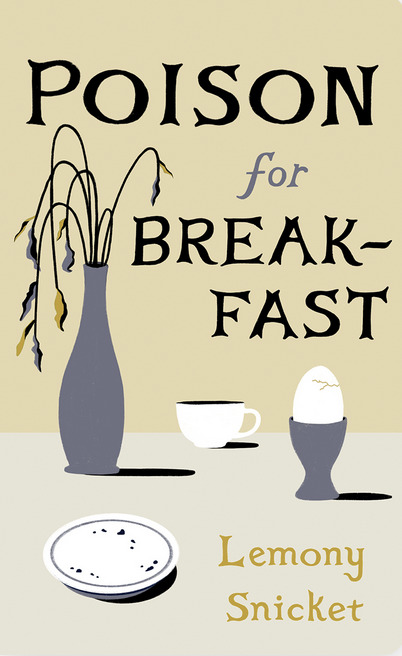
Presenting Poison for Breakfast by Lemony Snicket. Reviewed by Victoria Tatum of The Book Traveler for In the Stacks.
#Poison for Breakfast#Lemony Snicket#young adult#teen#poisoning#authors#philosophy#books#reading#detective#mystery#Books#Librarians#Reading#AmReading#MyLibrarian#Guest Librarian#In the Stacks#video book reviews#Librarian Book Reviews
2 notes
·
View notes
Text
pondering...
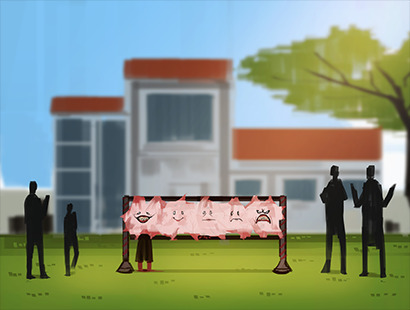

how old WAS shy look...
#blabla#put the first pic bc it actually showed just how small they were...#like i always did imagine them as small but since the games have a chibi style its not like i could actually compare their height to anyone#it is mostly bugging me bc im writing shy look pre distorting and i gave them a job.#but are they actually a teen or smth...........#like hod herself is probably one of the youngest librarians... for her to call them a kid...#it doesnt FEEL like theyre a kid though... maybe just a young adult.......#tiny tiny adult...
4 notes
·
View notes
Text

Fantasía, aventuras y mucha magia. Lo tomé prestado de la biblioteca sin grandes pretensiones pero ha resultado ser una gran sorpresa y una lectura de esas que no puedes soltar hasta terminarlo. Diversión entre letras!
#yoleoautoras#books#literature#librarians#public libraries#books and libraries#libraries#literatura#libros#biblioteca#fantasy#aventuras#young adult#yoleoautorasOct#jessica townsend#nevermoor#las pruebas de morrigan crow#the trials of morrigan crow
6 notes
·
View notes
Text
More than a quarter of readers of YA are over the age of 28 research shows
Report commissioned by HarperCollins shows that uptake in YA fiction in older readers is due to behavioural changes described as ‘emerging adulthood’ or delaying ‘adult’ life
by Lucy Knight
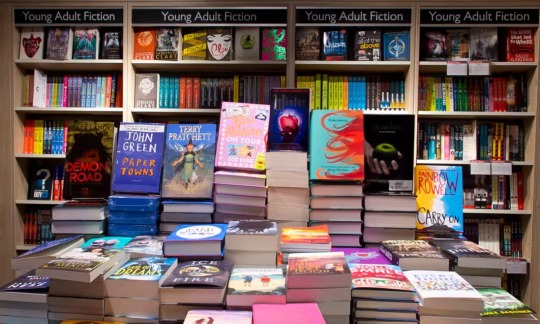
Young adult fiction such as The Hunger Games, A Good Girl’s Guide to Murder and the Heartstopper graphic novels might be aimed at teenagers – but new research has shown that more than a quarter of readers of YA in the UK are over the age of 28.
Research commissioned by publisher HarperCollins, in collaboration with Nielsen Book, the UK book industry’s data provider, suggests that a growing number of adult readers have been reading YA fiction since 2019. According to the report, 74% of YA readers were adults, and 28% were over the age of 28. The research suggests this is due to behavioural changes described as “emerging adulthood”: young people growing up more slowly and delaying “adult” life. The feelings of instability and “in-betweenness” this can cause has led to young adults seeking solace in young adult fiction – and for some these books remain a source of comfort as they grow older.
READ MORE
4 notes
·
View notes
Text
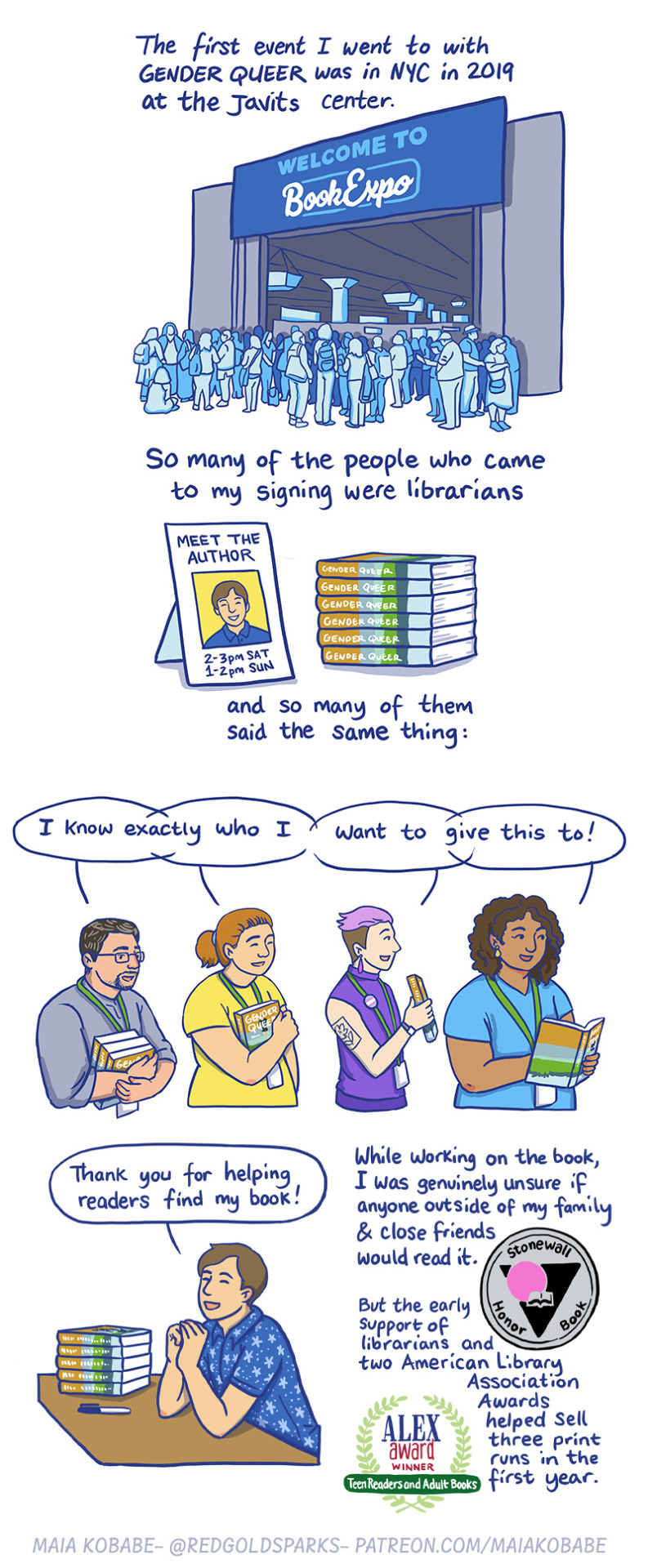
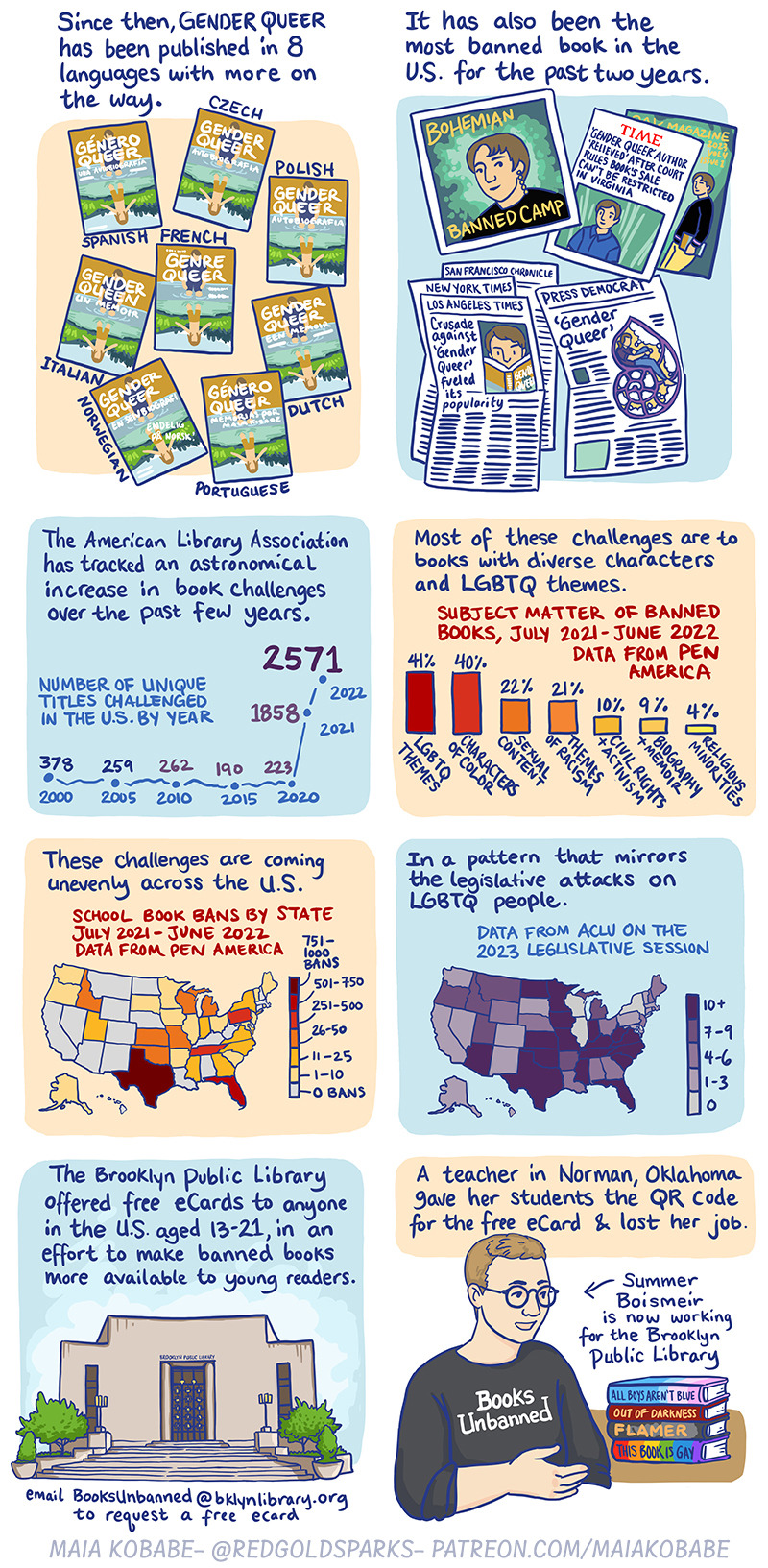
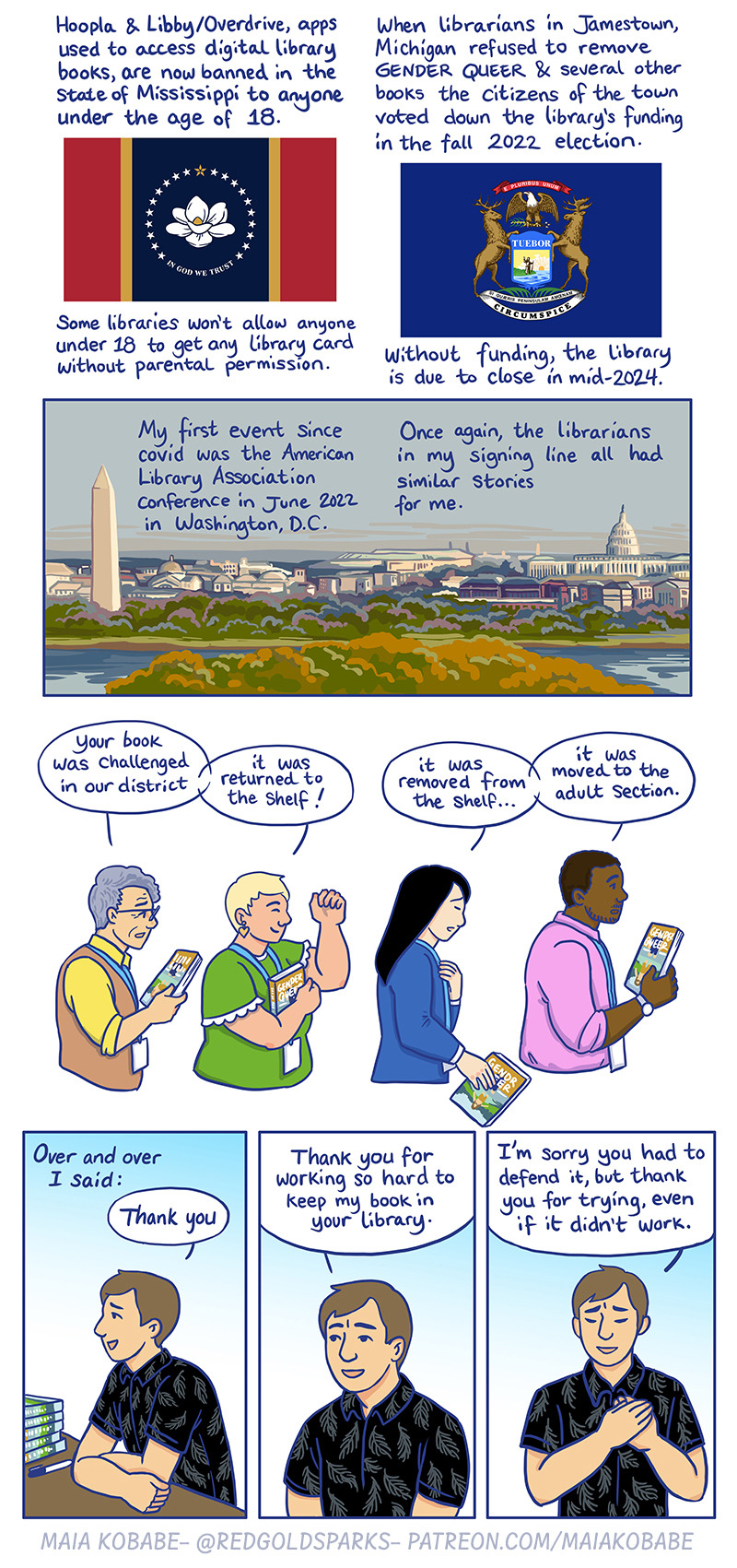
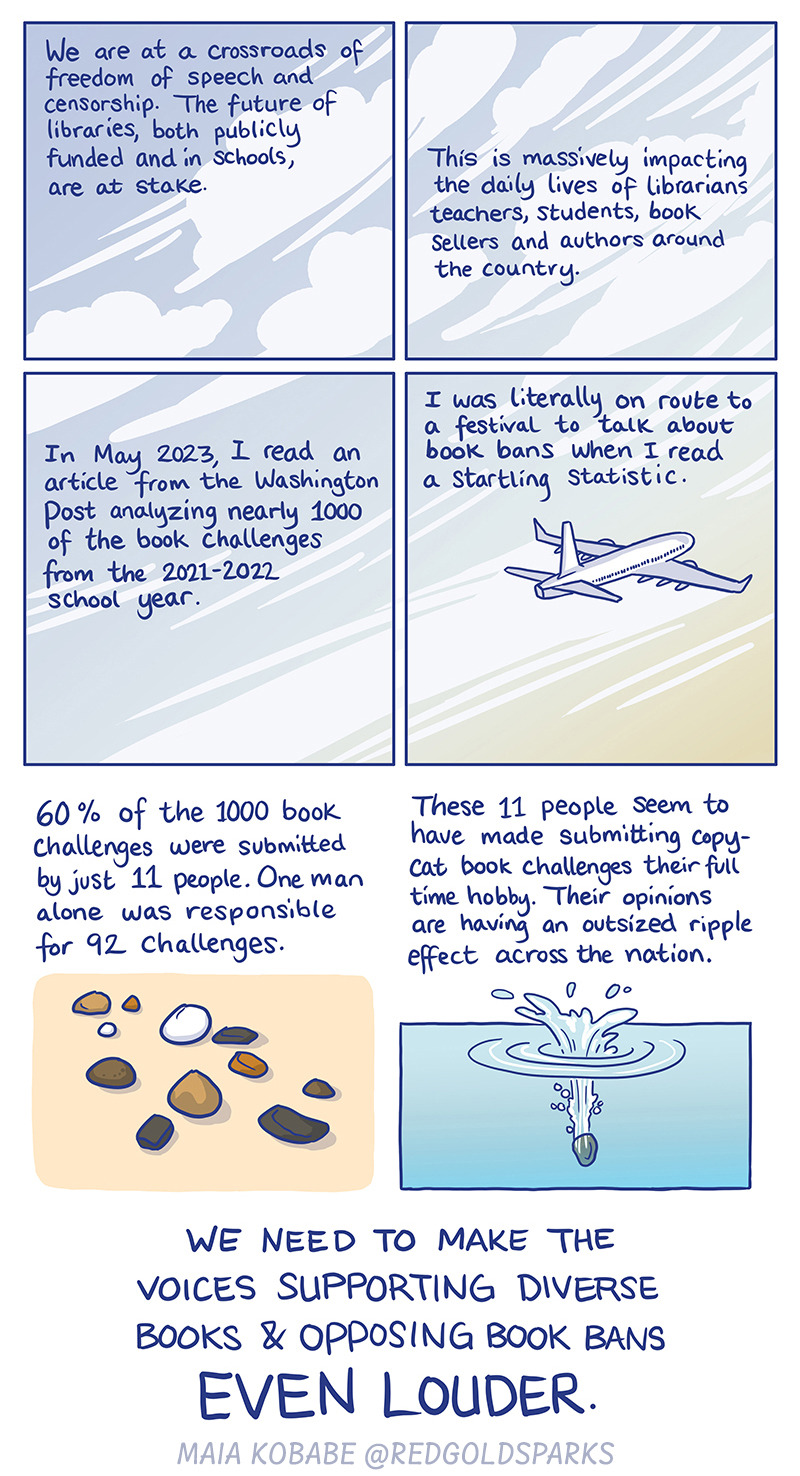
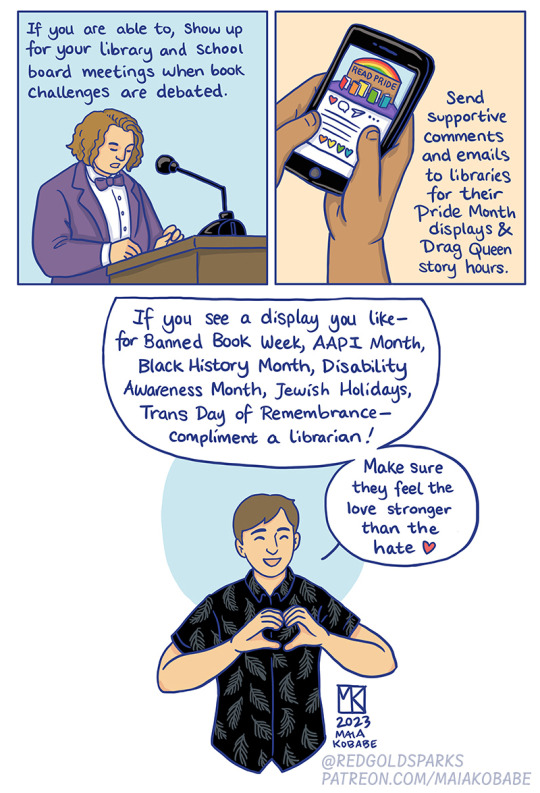
My very last comic for The Nib! End of an era! Transcription below the cut. instagram / patreon / portfolio / etsy / my book / redbubble
The first event I went to with GENDER QUEER was in NYC in 2019 at the Javits Center.
So many of the people who came to my signing were librarians, and so many of them said the same thing: "I know exactly who I want to give this to!"
Maia: "Thank you for helping readers find my book!"
While working on the book, I was genuinely unsure if anyone outside of my family and close friends would read it. But the early support of librarians and two American Library Association awards helped sell two print runs in first year.
Since then, GENDER QUEER been published in 8 languages, with more on the way: Spanish, Czech, Polish, French, Italian, Norwegian, Portugese and Dutch.
It has also been the most banned book in the United States for the past two years.
The American Library Association has tracked an astronomical increase in book challenges over the past few years. Most of these challenges are to books with diverse characters and LGBTQ themes. These challenges are coming unevenly across the US, in a pattern that mirrors the legislative attacks on LGBTQ people.
The Brooklyn Public Library offered free eCards to anyone in the US aged 13-21, in an effort to make banned books more available to young readers. A teacher in Norman, Oklahoma gave her students the QR code for the free eCard and lost her job. Summer Boismeir is now working for the Brooklyn Public Library.
Hoopla and Libby/Overdrive, apps used to access digital library books, are now banned in Mississippi to anyone under 18. Some libraries won’t allow anyone under 18 to get any kind of library card without parental permission.
When librarians in Jamestown, Michigan refused to remove GENDER QUEER and several other books, the citizens of the town voted down the library’s funding in the fall 2022 election. Without funding, the library is due to close in mid-2024.
My first event since covid hit was the American Library Association conference in June 2022 in Washington, DC. Once again, the librarians in my signing line all had similar stories for me: “Your book was challenged in our district"
"It was returned to the shelf!"
"It was removed from the shelf..."
"It was moved to the adult section."
Over and over I said: "Thank you. Thank you for working so hard to keep my book in your library. I’m sorry you had to defend it, but thank you for trying, even if it didn't work."
We are at a crossroads of freedom of speech and censorship. The future of libraries, both publicly funded and in schools, are at stake. This is massively impacting the daily lives of librarians, teachers, students, booksellers, and authors around the country. In May 2023, I read an article from the Washington Post analyzing nearly 1000 of the book challenges from the 2021-2022 school year. I was literally on route to a festival to talk about book bans when I read a startling statistic.
60% of the 1000 book challenges were submitted by just 11 people. One man alone was responsible for 92 challenges. These 11 people seem to have made submitting copy-cat book challenges their full-time hobby and their opinions are having an outsized ripple effect across the nation.
WE NEED TO MAKE THE VOICES SUPPORTING DIVERSE BOOKS AND OPPOSING BOOK BANS EVEN LOUDER.
If you are able too, show up for your library and school board meetings when book challenges are debated. Send supportive comments and emails about the Pride book display and Drag Queen story hours. If you see a display you like– for Banned Book Week, AAPI Month, Black History Month, Disability Awareness Month, Jewish holidays, Trans Day of Remembrance– compliment a librarian! Make sure they feel the love stronger than the hate <3
Maia Kobabe, 2023
The Nib
19K notes
·
View notes
Text
Interview with YA Librarian: Jak Miller
For my Librarian Interview, I met with the Young Adult Services Librarian at Hopkinton Public Library in Hopkinton, MA. What we scheduled to take twenty minutes actually took nearly an hour as we connected and fed off of each other. We first started a little formal about resources formally and informally she uses to build and hone her collection and what she uses to make sure she is curating YA needs in the community as well as the larger network.
Jak explained something quite interesting to me: that she regularly compares her department to five other demographically similar towns in MA, Southern NH, and RI- sharing commonality in size, budget, collection, and community aspects. She continued to explain that in curating the collection that works best for the community she serves in a way that fosters recreational reading and a lifelong love of reading and library spaces. I asked her to expand upon this and she explained that recreational reading drops off a lot in middle school so she spends a fair amount of time connecting with the local schools to bridge gaps and lift each other up.
Jak said that there are actually a lot of technology savvy teens these days, especially because of COVID, so we just need to remind them of what exists and how to get to it, they handle the rest. She explained that COVID didn’t help with the boundary issues that already existed in teens to begin with. Jak went on to say that it’s often Mean Girls in practice daily with cliques. We ask ourselves, how do we keep the peace between social groups? We can do this to the best of our abilities but teens are teens. This is the safest place where they can make mistakes and learn from them. Hopefully the extent of it is we tell them to take a lap and come back another day.
An incredible and passionate discussion we had was Jak’s thoughts on Managing Parent Expectations versus Teen Needs. There seems to be an awful awareness and balance between adult expectations and what teens need and are able to do. She explained the teen's parents like she has explained the teen's nonfiction presence: “excessively concerned with minor details or rules”; greater concern with morality and ethics over basic knowledge about something like safe sex or your menstruation and overall basic privacy and self-guidance. Jak has even expressed concern over the over-structuring to the point of mental breakdown over staying up late for homework and they still aren’t up to their parent’s standards. We are in a position where we try to help and make it easier for them best we can.
Quotes from Jak Miller:
“I may not relate directly to that person, but it makes my world bigger”
“They are not using literature to expand the world of their child, they are using it to keep it closed”
0 notes